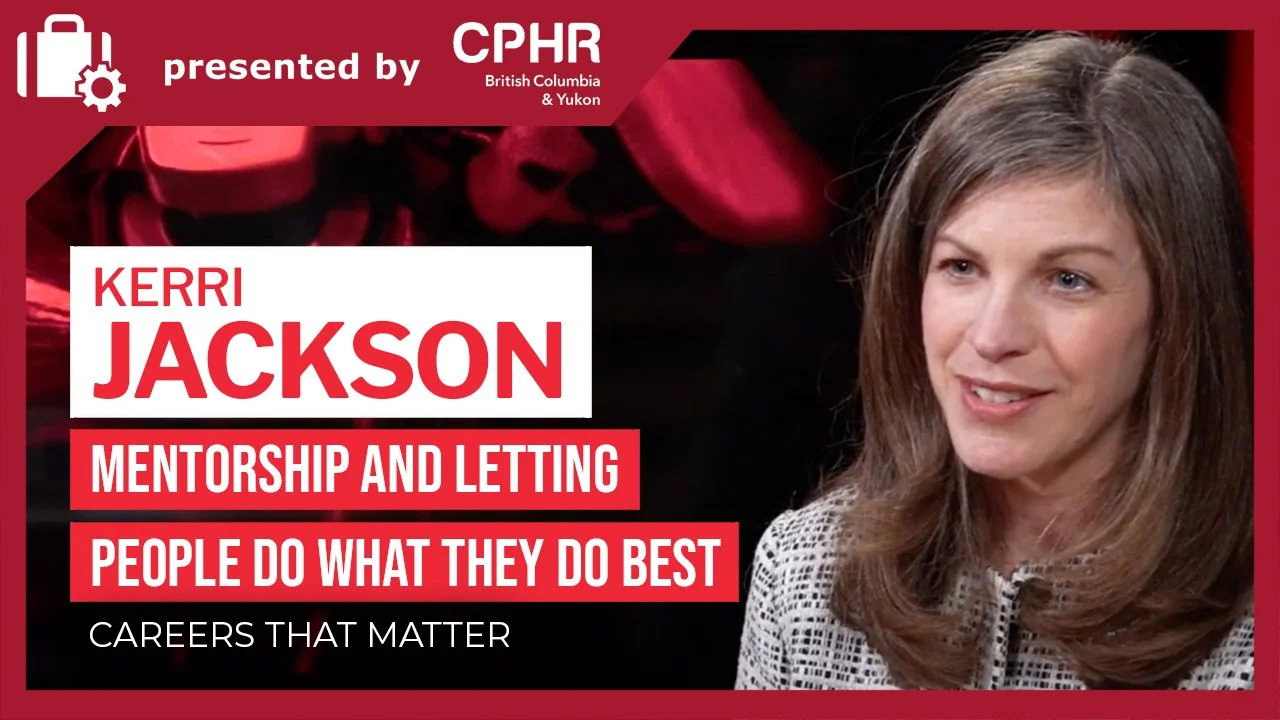
Episodes
Search episodes:
Browse by category
Creating a self-sufficient team to build housing
When you think of a CEO, do you think of someone who is jumping into the fray and dealing with everything hands-on? This is not how Beau Jarvis does it – to him, it is not only about time management, but also about mentoring a team that can be competent without micromanaging. This is a must, as the leader of Wesgroup, which builds all kinds of housing throughout British Columbia. After all, it’s not just about building homes – it’s also about talking with government and creating more sustainable housing outcomes.
Being curious, willing to make mistakes, and taking risks
As the CEO of the Mining Association of British Columbia, Michael Goehring represents the entire mining and smelting industry of the province and advocates the sector’s interests to the government.
The upsides of being flexible and curious
“It’s all about people.” That is how Michele Matthews sees her job – managing people in order to move forward a vision. It all harkens back to her marketing days, which took her to all sorts of different roles in her small organization as time went along. After all, in small start-ups, sometimes you have to do a job that you weren’t hired for – this fed into her curiosity and led to her career taking off in the human resources sector, as COO of AG Care and a board member at the Chartered Professionals in Human Resources (CPHR) of British Columbia & Yukon.
A passion for being innovative and disruptive
Glyn Lewis never thought he would start a renewable development company. He thought he would be a teacher or chemist – but he found that the creative and analytical parts of him were more suited for something else. To him, working in construction but NOT coming from the construction industry helps feed into his passion for being innovative and coming up with disruptive ideas.
Understanding what you’re lobbying for
David Blackmon doesn’t see what he does as work; after all, he is doing what he loves, writing articles on energy and running a substack on the topic. It sounds like he knew what he wanted to do in life from the start – but based on what he was like as a youth, nothing could be farther from the truth.
Understanding and building relations in the Asia Pacific region
What is going on in the Asia Pacific region? And how do we use that knowledge to do business and build relations? That is the mission for Vina Nadjibulla of the Asia Pacific Foundation. After all, understanding different places seems to be her calling, being born in the Soviet Union and growing up in multiple countries – and even working with the United Nations.
Mentorship and letting people do what they do best
At Concert Properties, Kerri Jackson manages property. It sounds simple, but it is a complex mixture of making sure all rents are paid, new tenants come in, and more.
The connection between career success and people
How do you measure success? For Jacquie Griffiths’ role in Invest Vancouver, it has to do with how many jobs Vancouver attracts. She had always been interested in economics, but also people – and how those two are always linked. To her, the willingness to listen to your people (and change your approach if needed) is key to success.
Believing in your people to do the right thing
Klaus Kleinfeld believes in people. To him, that is how businesses succeed or fail – knowing how to trust your people to do the right thing, even when circumstances change. And if you’re good at it and find it enjoyable, then you may have a chance to aim for a higher position, without it feeling “like a drag.”
Helping small businesses reach year five (and beyond)
What does Maureen Palmer do? Having many roles, it was hard to answer that question, until her daughter came up with an apt description – “knowledge translation.” And as a creator of documentaries which take time to make, that knowledge translation has to anticipate what the public wants to talk about months from now. To her, this is key to being successful and a big reason to keep her eyes and ears open.
Teaching others how to grow and move up in their careers
Cruz Gamboa’s path to being an executive coach started with a love of finance. Through building his experience and moving up the ladder in the financial departments of different companies, it made him realize that a large part of financing is treating it like a “sales job” and that these experiences made him more well-rounded – this gave him valuable insight leading to his current job as an executive coach, teaching others to use their experiences to get a step up in their careers.
Advocating and educating about how to develop communities
How is your city shaped? This is what Anne McMullin has to know, as the leader of the Urban Development Institute. In her job, she is constantly educating and informing others about how British Columbia’s communities are developed, particularly around real estate issues. This is a far cry from where she started out, in the journalism world; but over time, she found that the business world interested her more and more – so she made a career pivot.
Creating a mental health assessment tool
Getting help with and getting assessed for mental health can be difficult – Jason Morehouse seeks to change that with HiBoop, a tool that helps professionals improve the quality of their treatments. To get started, he had to get an understanding of technology and how to leverage it with good developers and passionate product builders, and wrap it up with awareness among people who are in charge of the brand.
Work-life balance and doing the impossible
Brian Scudamore is a serial entrepreneur. He is best known for being the brains behind 1-800-GOT-JUNK, a national trash collection company in Canada. But he sees his role as more than a CEO; he grows the business culture of his companies. To him, business is always fun – as long as he pays attention to work-life balance, which allows him to be more present at work.
The importance of figuring out where you’re headed
Aubrey Kelly knows there are so many things that you can’t control – but you can set the direction that you’re heading. That is the philosophy he has used for his role as CEO of UBC Properties Trust, which handles real estate portfolios of the University of British Columbia. You don’t have to be an expert – you simply have to figure out where you’re headed and have others around you buy into your plan.
How to write and put a book together
Greg Barnsdale is no ordinary author – his topic deals with death, based on his experiences in the funeral and financial planning industries. This has posed a challenge in reaching a target market, which he learned to tackle through writing courses. After that, it was just a matter of learning how to put a book together – literally.
Helping businesses understand their political communities
“You can’t be a good political strategist if you don’t understand the community of voters around you,” Kareem Allam claims. That is how he gets his work in an increasingly complex political landscape. This includes both ideas and how to get those ideas out, whether it be via new forms of media or the rise of technology. His clients are all from the private sector who want to gain social and regulatory license, so that the projects go forward the right way.
Taking opportunities when they present themselves
For Krystle Wittevrongel, life is exciting but the days are long. Her role at the Montreal Economic Institute is to keep an eye on public policy of all types, in order to provide useful advice for stakeholders – an area that rarely takes a break. But she wouldn’t have it any other way.
Working hard in a dream job and answering a calling
NJ Ayuk believes he has a “dream job” – he gets to talk with everyone from climate activists to energy industry professionals every day. Based in South Africa, he gets to visit most countries in Africa, and sometimes to Asia, North America, and Europe. He works 10-15 hours per day but to him, this isn’t just a job – it’s a calling.
Holding investors’ hands during turbulent times
When you make a bad investment, you probably want someone to hold hands with. That is how Murray Leith describes his job – he is the one to hold your hand during turbulence and help keep you from panicking. This role stems from his family and educational background in finance – he knew he wanted to be in that industry. As time went along, he realized that his goal depended on writing and discovering what he had to say – and how to say it well.




















